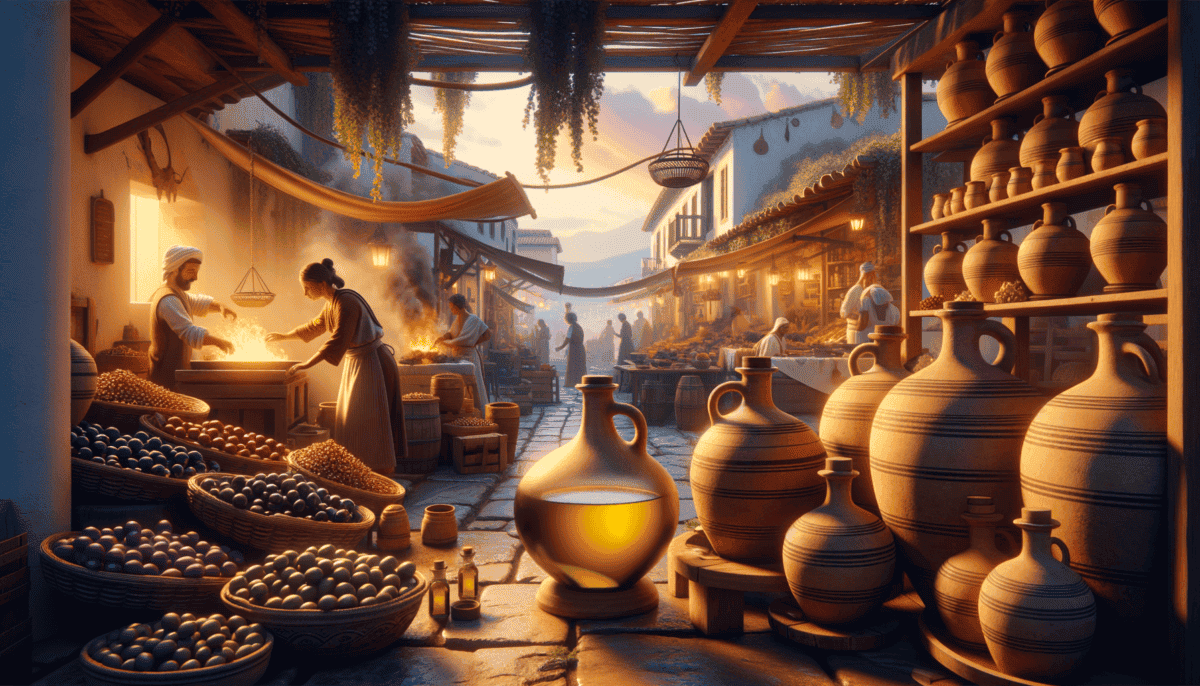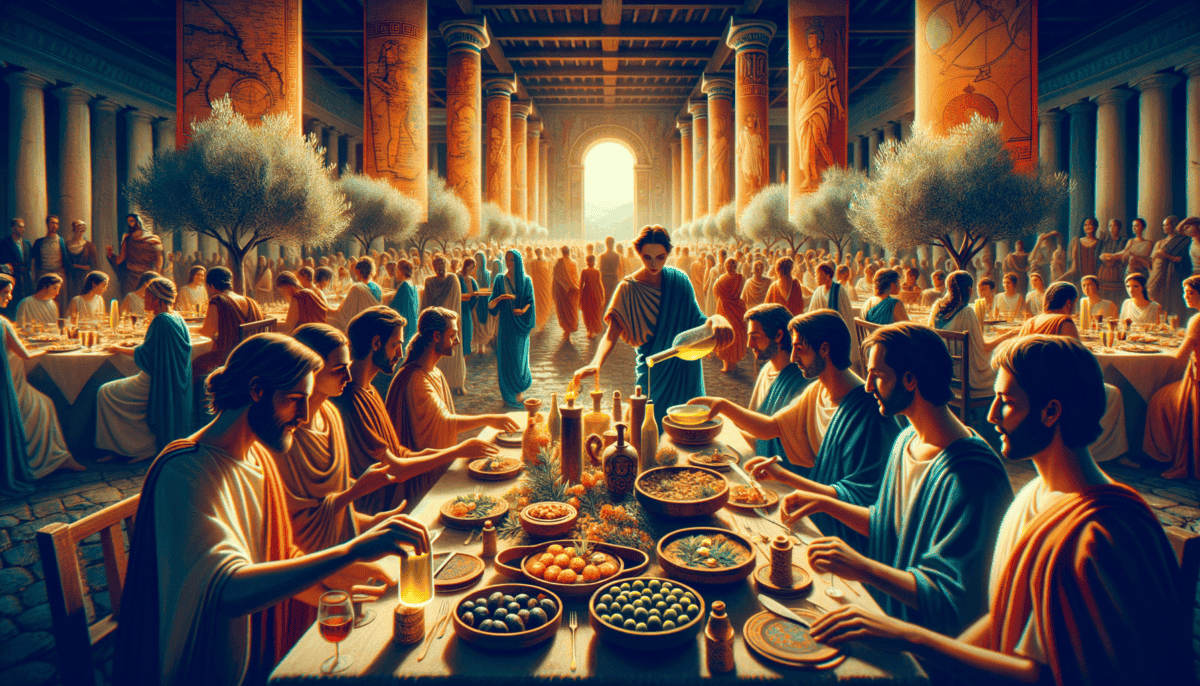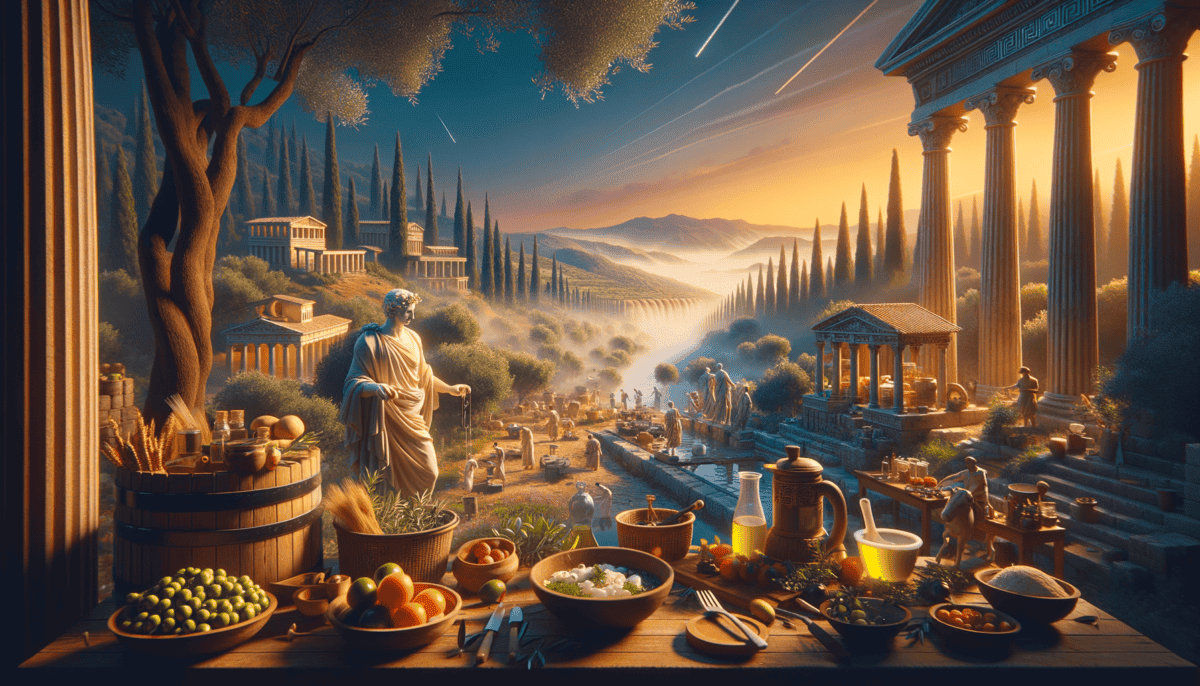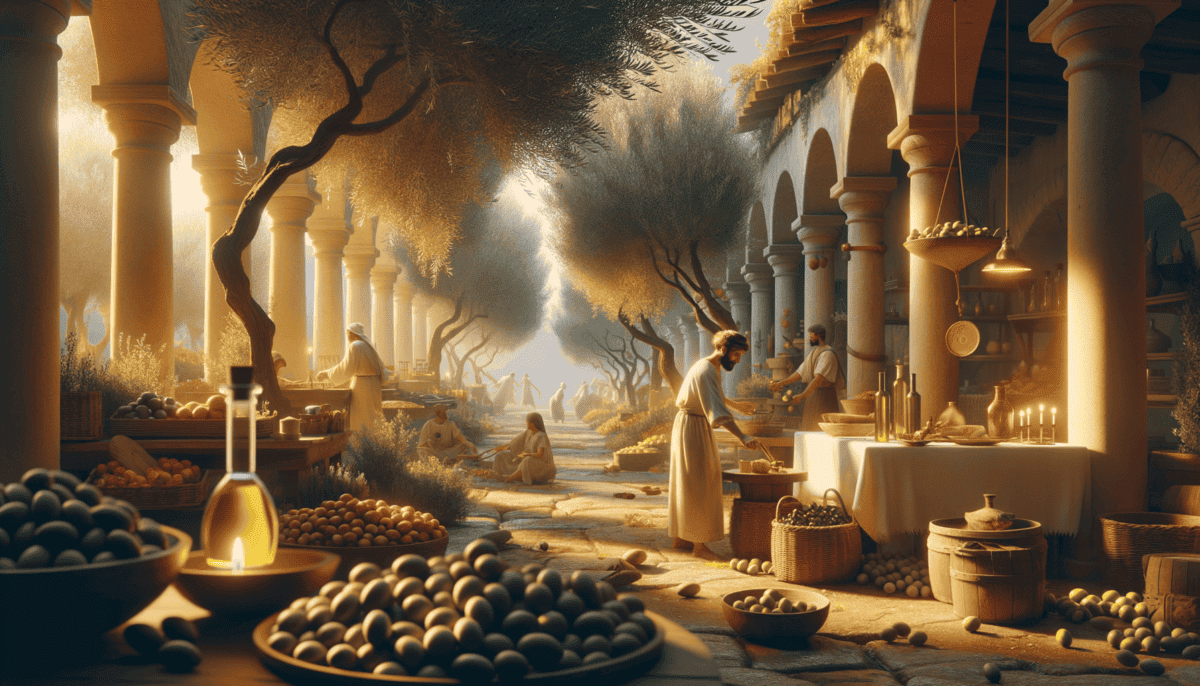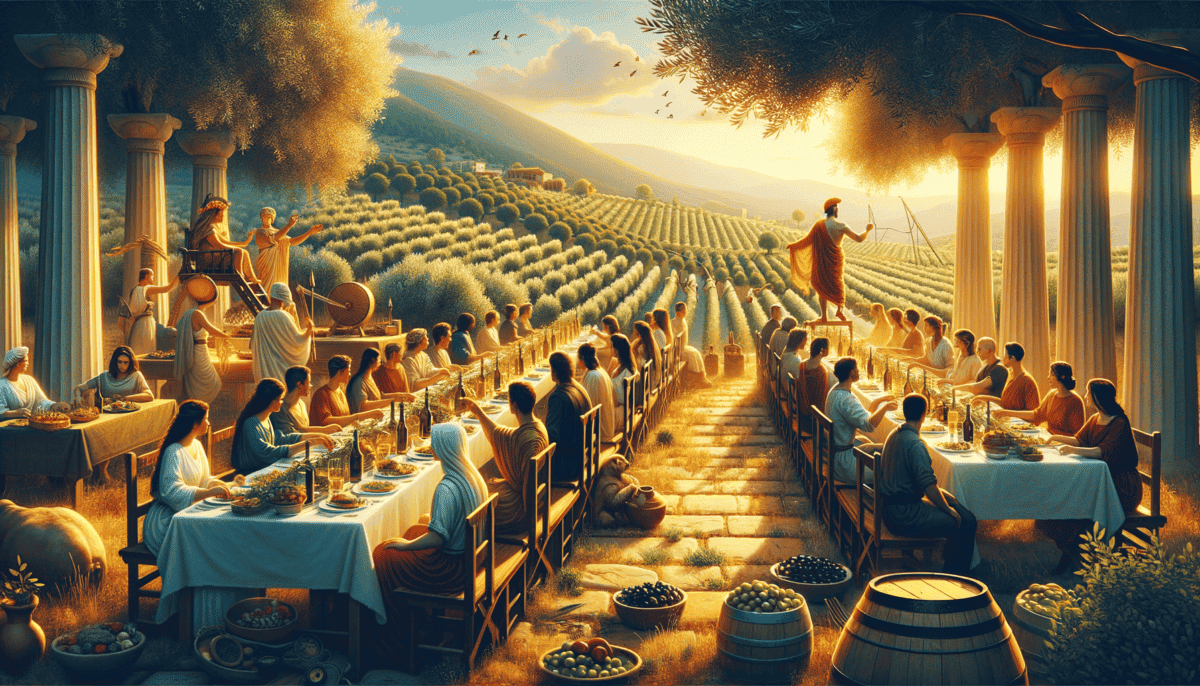The Olive Grove’s Secret
The warm sun shone on Maria’s face as she walked through her family’s olive grove. The trees were old – very, very old. Some had been growing since her great-great-grandmother was little!
“Papou, tell me again about our special trees,” Maria said to her grandfather. She loved hearing stories about their olive grove.
Her grandfather smiled and patted an ancient twisted trunk. “These trees are precious, little one. Our Greek ancestors knew they were magic.”
“What made them magic, Papou?” Maria’s eyes grew wide with wonder.
“Well,” he began, sitting down on a smooth rock, “long ago, Greeks figured out that olives could do amazing things. The green fruits weren’t just yummy to eat – they could make oil for cooking, medicine, and even lamp fuel!”
Maria touched the silvery-green leaves above her head. “How did they learn to grow them?”
“That’s a special story,” Papou said with a twinkle in his eye. “Our ancestors watched the trees carefully. They learned that olive trees like sunny hills and don’t need much water. They found out how to plant new trees from cuttings.”
“Every olive tree has a story, Maria. Some tell tales from hundreds of years ago!”
Maria watched as her grandfather showed her how to check if olives were ready to pick. “Not too green, not too black – just right!” he explained.
“Did you know,” Papou continued, “that in ancient times, winners at the Olympic Games got crowns made of olive branches? And olive oil was worth more than gold!”
The little girl gasped. “More than gold?”
“Yes! People used it for everything. They rubbed it on their skin, put it in their hair, and used it to make their food taste better. Greek sailors even took olive oil on long trips because it stayed good for a long time.”
Maria helped her grandfather collect fallen olives in a basket. “What happens to the olives now?” she asked.
“Ah, that’s where the real magic happens! We’ll take them to the press, where they’re crushed to make oil – just like our ancestors did. The only difference is we use machines now instead of stones.”
As the sun began to set, Maria looked at the ancient trees with new respect. She understood now why her family took such good care of them. These weren’t just trees – they were living history, sharing their gifts just as they had done for thousands of years.
“Remember, Maria,” Papou said as they walked home, “these trees connect us to our past. Every time we care for them, we’re keeping old wisdom alive.”
That night, as Maria helped her mother cook with their own olive oil, she thought about all the Greek families who had done the same thing since ancient times. She felt proud to be part of such an old and special tradition.
A Culinary Revolution Begins
In a bustling Greek kitchen, young Alexandros watched his mother Sophia prepare dinner. The warm smell of herbs filled the air.
“What makes our food taste so good, Mama?” he asked, standing on his tiptoes to peek into a clay pot.
Sophia smiled, drizzling golden olive oil over fresh vegetables. “The secret is in this magical liquid, my dear. Our ancestors discovered its power long ago.”
“Tell me how they found out!” Alexandros bounced excitedly.
“Well,” Sophia began, stirring the pot, “many years ago, Greek cooks tried something new. Instead of just eating olives, they crushed them to make oil.”
She picked up a small clay bottle. “See this? It’s just like the ones our ancestors used. They found that food cooked in olive oil tasted better and stayed fresh longer.”
“Olive oil wasn’t just for cooking – it was medicine too! People used it to heal cuts and make their skin soft.”
“Traders came from far away to buy our olive oil,” Sophia continued. “They sailed across the sea in big boats filled with clay jars of oil.”
“Really? That far?” Alexandros’s eyes widened.
“Yes! Greek olive oil became famous everywhere. People learned that our way of cooking was special.”
• Cooking tasty food
• Making medicine
• Lighting lamps
• Trading with other lands
As they cooked together, Sophia showed Alexandros how to make a simple sauce. “First, we mix olive oil with lemon juice and herbs – just like my grandmother taught me.”
“Can I help?” Alexandros asked eagerly.
“Of course! Here, drizzle the oil slowly while I stir.” She guided his small hand. “See how the oil makes everything smooth and shiny?”
Later, as they sat down to eat, Sophia pointed to the dishes on their table. “Each of these foods has a story. The oil in our bread? Priests used it in temples. The herbs in our soup? Healers used them as medicine.”
“Greek cooks were smart!” Alexandros declared, taking a big bite.
“Yes, they were. And their clever ideas spread everywhere. Soon, people in other lands wanted to cook like Greeks too.”
The kitchen filled with the sound of happy eating and sharing stories. Outside their window, ships sailed across the blue Mediterranean, carrying Greek olive oil to distant shores, just as they had done for hundreds of years.
“Remember,” Sophia said, ruffling her son’s hair, “every time we cook with olive oil, we’re keeping old traditions alive. We’re sharing the gift our ancestors gave the world.”
That night, Alexandros dreamed of ancient Greek kitchens and brave sailors carrying precious olive oil across the seas, spreading the tastiest secret in the world.
When Worlds of Flavor Collide
Marcus stood amazed in the busy Roman market. His nose caught a new smell – something different from the usual Roman food.
“What’s that wonderful smell?” he asked his father, Lucius, a Roman merchant.
“That, my son, comes from the Greek traders’ stalls. They bring new ways of cooking with something special – olive oil!”
They walked to a Greek trader’s stall where Herodotus, a friendly Greek cook, was showing Romans how to use olive oil.
“Try this,” Herodotus smiled, offering them bread dipped in golden oil with herbs. “It’s how we eat in Greece.”
Marcus’s eyes grew wide as he tasted it. “Papa, it’s amazing! Can we cook like this at home?”
“When Greeks and Romans shared food ideas, both became better cooks!”
Lucius watched as more Romans gathered around Herodotus’s stall. “Look how everyone wants to learn Greek cooking,” he said.
“We Greeks have been using olive oil for hundreds of years,” Herodotus explained. “It makes food taste better and keeps longer too.”
• Using olive oil in cooking
• Making tasty sauces
• Growing olive trees
• New ways to preserve food
“Can you teach us?” asked a Roman woman holding a clay pot.
“Of course!” Herodotus beamed. “First, we need good olive oil…”
Soon, big ships full of olive oil sailed to Rome every day. Roman farmers started planting olive trees everywhere they could.
“Look there!” Lucius pointed to workers building new roads. “These roads will help us send olive oil all over the Roman world.”
“Even to places far away?” Marcus asked.
“Yes! From Britain to Egypt, everyone will taste our olive oil.”
Back home, Marcus watched his mother Claudia cook dinner using their new Greek olive oil.
“The Greek way of cooking is changing how all Romans eat,” she said, drizzling oil over roasted vegetables.
️ That evening, their dinner table had both Roman and Greek dishes. “This is the best of both worlds,” Marcus said happily.
“Yes,” Lucius agreed. “By learning from the Greeks, we Romans are making our food even better.”
Outside their window, more olive trees were being planted. Roman soldiers, traders, and travelers would soon carry these new food ideas to every corner of their growing empire.
Marcus helped his mother clean up after dinner. “Tomorrow, can we go back to learn more from Herodotus?”
“Of course,” she smiled. “There’s always more to learn about good food!”
Growing a Tasty Empire
The warm sun shone on Julia as she watched workers plant new olive trees in her family’s field. Her father, Lucius, had learned about olive growing from their Greek friend Herodotus.
“Look how many trees we’re planting!” Julia clapped with joy.
“Yes, little one,” smiled Lucius. “Soon these trees will help feed the whole Roman Empire.”
In the storage room, Julia’s mother Claudia showed her something new. “See these clay jars? They keep olive oil fresh for months!”
“How do they work?” Julia asked, touching the cool clay.
“The Greeks taught us to seal them just right. Now we can send oil everywhere without it going bad.”
“Good food brings people together, no matter where they’re from!”
At the marketplace, Julia saw people from many lands trying Roman-Greek foods:
• Olive oil bread dip
• Herb-flavored oils
• Greek-style roasted meats
• Olive oil cakes
“Everyone wants to cook like us now!” said Marcus, Julia’s brother, watching a Spanish trader buy olive oil.
“That’s because we took the best Greek ideas and made them even better,” Claudia explained.
Julia saw her friend Cornelia running over. “Julia! Come see what my mom learned to make!”
At Cornelia’s house, her mother was making a new kind of bread with olive oil in it.
“It stays fresh longer than old Roman bread,” Cornelia’s mother said proudly.
“Our food is traveling far,” Lucius told the girls that evening. “Roman soldiers take these recipes everywhere they go.”
“Even to cold Britain?” Julia asked.
“Yes! And they’re planting olive trees in new places too.”
Later, Julia helped her mother prepare dinner using their special cooking tools from Greece.
“The Greeks gave us more than just olive oil,” Claudia said. “They taught us new ways to cook meat and fish too.”
️ That night, their dinner table was full of foods that mixed Roman and Greek styles.
“Our empire isn’t just about land,” Lucius said. “It’s about sharing good things with everyone.”
“Like olive oil?” Julia asked.
“Yes, and all the tasty foods we can make with it!”
Outside, the new olive trees swayed in the evening breeze. Soon they would give fruit that would help feed people across the huge Roman world.
Julia looked at the trees and smiled. She knew she was watching something big grow – not just olive trees, but a whole new way of eating that would last for many years to come.
“Tomorrow we’ll check on the baby trees,” Lucius promised. “They’re growing just like our big Roman family – getting bigger and stronger every day.”
A Taste That Lives Forever
Maria stood in her grandmother’s sunny kitchen in Greece, breathing in the wonderful smell of fresh bread and olive oil.
“Yiayia, tell me again how our family has been making olive oil since forever!” Maria begged.
“Oh, little one,” Yiayia smiled, drizzling golden oil over warm bread. “Our olive trees are as old as the stories themselves.”
“Just like the ancient Romans and Greeks did, we still press olives to make oil,” Yiayia explained. “But now we have better machines to help us.”
Maria watched as her grandmother mixed herbs into olive oil, just like her own grandmother had taught her.
“Every drop of olive oil carries a piece of history with it.”
At school the next day, Maria’s teacher showed the class pictures of people all over the world using olive oil:
• Cooking healthy meals
• Making yummy salad dressing
• Helping medicine taste better
• Making skin soft and smooth
“Scientists now know olive oil is super good for us,” the teacher said. “But the Greeks and Romans knew that thousands of years ago!”
After school, Maria visited the local museum with her class. They saw old clay pots that once held olive oil.
“Look!” Maria pointed excitedly. “These look just like the stories about Julia and her Roman family!”
That evening, Maria helped Yiayia make dinner. They used olive oil just like their ancestors did.
“People everywhere love our Greek food now,” Yiayia said proudly. “Restaurants in New York and Tokyo make our recipes!”
On Sunday, Maria’s whole family went to check on their olive grove. The trees were old and twisted, but still strong.
“These trees have seen so much,” Dad said. “Some are hundreds of years old!”
“And we take care of them the same way people did long ago,” Mom added.
At dinner, Maria’s family sat down to eat. The table was full of foods made with olive oil – just like in ancient times.
“The best part is sharing food with people we love,” Yiayia said. “That hasn’t changed since Greek and Roman times.”
Maria dipped her bread in olive oil and thought about all the people who had done the same thing for thousands of years.
“Our olive trees are like a bridge,” Yiayia said. “They connect us to the past and help us make new friends today.”
“And they make yummy food!” Maria giggled.
“Yes, that too!” Yiayia laughed. “Some good things never change.”
As the sun set over the olive grove, Maria felt happy knowing she was part of such an old and special story – one that started with the Greeks and Romans and was still going strong.
“Tomorrow we’ll make olive oil cake,” Yiayia promised. “It’s a recipe older than these ancient hills!”
The Future of Flavor
The morning sun sparkled through Maria’s window as she jumped out of bed. Today was a special day – her school’s International Food Festival!
“Look what we made!” Maria proudly showed Yiayia the poster about olive oil’s journey through time.
• Greek farmers growing olives long ago
• Roman ships carrying olive oil
• Modern kitchens using olive oil today
• Future dreams of olive growing
“Beautiful work!” Yiayia smiled, packing their special olive oil cake. “Now everyone can learn our story!”
At the festival, Maria’s teacher Mrs. Chen helped set up their display.
“Did you know,” Mrs. Chen said, “that astronauts now take olive oil to space? The Greeks would be amazed!”
“From ancient hills to distant stars, olive oil keeps spreading joy!”
Children from different countries shared their foods. Many used olive oil in new ways:
“We mix it with spicy peppers!” said Carlos from Mexico.
“My mom uses it in curry!” added Priya from India.
Maria beamed. “The Greeks and Romans would love seeing how their favorite food makes new friends!”
After school, Maria helped plant a baby olive tree in the school garden.
“This tree might grow for hundreds of years,” the garden teacher said. “Just like the ones your ancestors planted.”
Maria patted the small tree. “I’ll tell my grandchildren about planting you!”
Back home, Yiayia showed Maria something exciting on her tablet – farmers using robots to help pick olives!
“The future is amazing,” Maria said. “But we still love olive oil just like the ancient Greeks did.”
“That’s right,” Yiayia nodded. “Some things get better with time.”
That evening, Maria drew a picture of what she thought olive growing might look like in the future: solar-powered presses, flying delivery drones, and trees growing in special greenhouses.
“Maybe one day we’ll grow olives on Mars!” she giggled.
“Who knows?” Dad smiled. “But wherever humans go, I bet they’ll take olive oil with them.”
As Maria got ready for bed, she looked at her family’s ancient olive grove through the window.
“The old trees and new ideas work together,” she thought. “Just like the Greeks and Romans did.”
She hugged Yiayia goodnight. “We’re part of a story that never ends, aren’t we?”
“Yes, little one,” Yiayia said softly. “As long as the olive trees grow and people share food together, our story lives on.”
That night, Maria dreamed of olive trees growing on distant planets, their branches reaching for new stars – but their roots still deep in the ancient earth of Greece.


